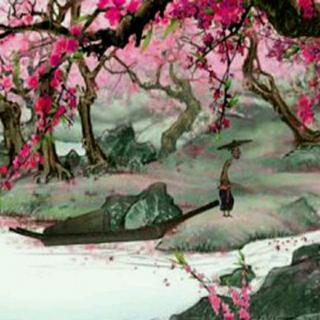
介绍:
《桃花源记》
作者: 晋 陶渊明
英译: 阿九
朗读: 阿九
晋太元中,武陵人捕鱼为业。缘溪行,忘路之远近。忽逢桃花林, 夹岸数百步,中无杂树,芳草鲜美,落英缤纷。渔人甚异之。复前行,欲穷其林。
林尽水源,便得一山,山有小口,仿佛若有光。便舍船,从口入。初极狭,才通人。复行数十步,豁然开朗。土地平旷,屋舍俨然,有良田美池桑竹之属。阡陌交通,鸡犬相闻。其中往来种作,男女衣着,悉如外人。黄发垂髫,并怡然自乐。
见渔人,乃大惊,问所从来。具答之。便要还家,设酒杀鸡作食。村中闻有此人,咸来问讯。自云先世避秦时乱,率妻子邑人来此绝境,不复出焉,遂与外人间隔。问今是何世,乃不知有汉,无论魏晋。此人一一为具言所闻,皆叹惋。余人各复延至其家,皆出酒食。停数日,辞去。此中人语云:“不足为外人道也。”
既出,得其船,便扶向路,处处志之。及郡下,诣太守,说如此。太守即遣人随其往,寻向所志,遂迷,不复得路。南阳刘子骥,高尚士也,闻之,欣然规往。未果,寻病终。后遂无问津者。
In the years of Tai Yuan, during the Jin dynasty, there lived a fisherman of Wu Ling. One day, he meandered along a creek, forgetting how far he had traveled, and happened upon a forest of peach blossoms. It stretched along the banks for several hundred feet. It was full of purely peach trees, its foliage lush and bright, petals filling the air with organised chaos. Curious, the fisherman moved forward, hoping to find what the forest was hiding at its end.
The forest hid the creek’s origin, a spring, and a towering mountain. There was a small opening in the mountain, at the end of which there seemed to be light. The fisherman secured his boat and entered the cave mouth, which preceded a narrow tunnel, barely wide enough for one to pass. He had walked a few tens of steps when the tunnel expanded suddenly. The land stretched far and flat; the houses standing in neat rows; with fertile fields, sparkling springs, and mulberry trees and bamboo in abundance; the paths crisscrossed. Household animals, among them chickens and dogs, were heard across the way, while people dressed in garments similar to those of the outside worked in the fields. Children and elderly frolicked about as they pleased.
Sighting the fisherman, the people raised a great clamour of surprise, and asked him from whence he came. The fisherman told all. The villagers invited him to their home, where they presented a feast of chicken and wine. News of the fisherman’s arrival spread throughout the village, and many came to inquire about the outside world. The people told him the story of their own ancestors who had fled to this sanctuary to escape the chaos of the darkest days of the Qin dynasty, taking their wives, children, and the rest of their village with them. No one had left the place since, and they were soon far removed from outside happenings. They asked for the era, and the fisherman was shocked to learn they knew not of the Han dynasty, not to say Wei and Jin. The fisherman patiently explained all he knew to them, the villagers sighing in dismay. The other villagers then offered him to feast at their own homes in turn, bringing out once more the food and drink. The fisherman stayed in this village for several days, before deciding to go. Before he took his leave, the villagers said: “There is no need for the outsiders to know of this place.”
The fisherman exited the mountain, retrieving his boat, and retraced his path along the creek, making marks along the way. He hurried to the county bureau, requesting an audience with the magistrate to tell him all about his adventure. The magistrate immediately sent men to accompany the fisherman in locating the mysterious hamlet once more. They tried to follow the markings he had made along the way, but to their dismay, they became hopelessly lost, and never found that path again. (Perhaps, they say, the fisherman’s questionable integrity in the nature of his second visit prevented his return.)
In Nanyang there was an honorable gentleman named LiuZiJi. When he heard of the place, he enthusiastically put in motion plans to find it. Unfortunately, he passed away from sickness before he could carry out his plan. From then on, no man has attempted the search. Maybe, finally left in peace, the descendants of those who once hosted the fisherman live, to this day, in the mountain behind the peach blossoms.
(And they all lived slightly confusedly ever after…. )

